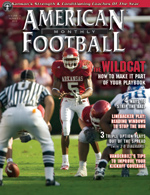Your Take: Dealing With Bad Calls
by: Lee Cardwell©
More from this issue
Anyone who has ever played, coached or even watched an athletic contest has experienced the phenomenon I’ll call “Referee Induced Mental Hysteria.” We have all been there: some official, referee, umpire or judge makes a call that brings the crowd to its feet, causes a coach to rip his headphones off, or leave the dugout. What happens next can cost the team the game. Not necessarily the ‘bad call’ and its penalty, but the coach’s reaction to the call and the effect that reaction has on the team.
Here is my advice: chill out. Take it in stride. Don’t give your players an excuse to lose the contest.
When a bad call happens, it is by definition a call or ‘non-call’ that does not go your way. The coach sets the example for the players regarding how to react to the situation. If the coach over-reacts, the impact on the team can be devastating. I first noticed this in youth league baseball. If the coach started complaining about the umpire, the players began to use the coach’s complaints as an excuse for them not getting hits, or not throwing strikes. Having a scapegoat for failure is as old as humanity and the official provides not only the scapegoat but in the group psychology of the team the coach’s actions can create a situation in which the players abdicate their own responsibility for their performance and place it on the official. It is easy, convenient, and requires no thought. It’s not my fault we lost. It was the officials’ fault.
As a coach, it is imperative to not allow that mindset to take hold of your team. How many contests have you watched and seen a coach over-react to a call and, as a result, the team begins focusing more on the officiating and less on their play? It happens all the time. I have seen coaches on the sidelines of major college programs and even in the NFL who look like they are near tears over an official’s call. Frustration morphs into resignation and defeatism.
The primary function of a coach during a game is to make decisions regarding the conduct of the game. Strategy decisions, player substitutions, play calling, etc. The coach is also the one person who has to accept risk for the hard decisions. A coach needs a focused and clear thought process to carry out his/her duties. Not a mind clouded with emotional baggage about something that is done and can’t be undone.
In dealing with officials, the coach’s goal must be to get the best-called contest possible. Saying that, we all know there will be mistakes. Players will make mistakes, coaches will make mistakes and, yes, officials will error. Coaches must not respond to the officiating error by compounding the distraction from just a loss of yardage or a strike out or a walk into something that strikes at the heart of your team’s competitiveness. If your player makes a mistake do you launch into hysterical screaming? Of course not.
Too often coaches can boil over with anger and the interaction with the official, rather than making things better actually making things worse. The coach is not logically thinking through the situation and thinking about the team. The coach is venting his anger towards the official. Dwight Eisenhower, a pretty fair football player and an outstanding coach early in his Army career, used to say that anger was a luxury he could not have. That’s good advice. Address the bad call with earnestness but with self-discipline and self-control. Deal with the issue. Don’t make your reaction to the call worse on your team than the call itself. Do not use the official as the target for a spleen-venting session. The players are watching and they will reflect the coach. Every coach lectures his team about dealing with adversity. Dealing with ‘bad calls’ is the opportunity for a coach to demonstrate how to deal with adversity.
Lee Cardwell played high school and college football and has coached at the high school level. He served 26 years in the U.S, Navy, retiring as a Captain. He also coached middle school football in Bahrain during his service.





